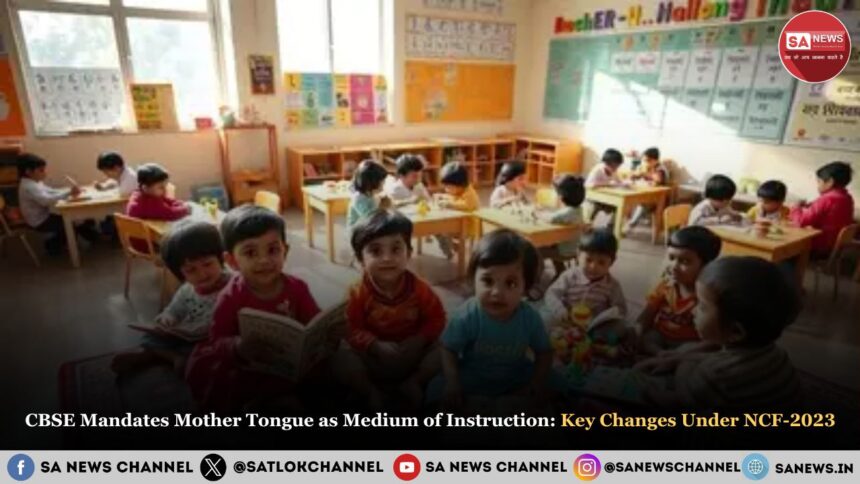1. Mother tongue/regional language (R1) to be used as the primary medium of instruction from Pre-primary to Grade 2.
2. English (R2) to be introduced orally in Grade 1; formal reading/writing from Grade 2.
3. Schools must comply with this mandatory language policy by July 2025.
4. At least one medium of instruction up to Grade 12 must be provided in R1.
5. CBSE will monitor and ensure progress reports and resource readiness.
What is This Directive About?
The directive ensures the implementation of R1 (mother tongue/regional language) as the primary medium of instruction in the foundational years to enhance comprehension, reduce rote learning, and foster inclusive education.
What is NCF and Its Purpose?
The National Curriculum Framework (NCF), developed by NCERT, aims to guide education policy and curriculum design to ensure uniform learning standards across India. The 2023 version promotes conceptual clarity, multilingualism, and child-centric education.
Why R1 as Medium of Instruction Helps?
Using the mother tongue helps children grasp concepts faster, improves classroom engagement, and simplifies complex subjects like Math and Science. This also reduces dropout rates caused by early language barriers.
Implementation Timeline:
Schools must be prepared by July 2025. Preparations starting June–July 2025 will include:
- Teacher training programs
- Curriculum updates
- Resource allocation
- Monthly progress reports submitted to CBSE
What Research Shows:
- 20–30% better learning outcomes in mother tongue instruction (as per multiple studies)
- World Bank reports indicate 6–8 years of R1-based education leads to better long-term earnings and academic outcomes.
Implementation Challenges:
- Lack of resources:
Shortage of quality textbooks and materials in regional languages. States will need to actively develop localized content.
- Teacher readiness:
Teachers may need training in pedagogy and fluency for effective teaching in R1. NCERT has begun addressing this.
- Parental preference for English:
Many parents associate English with future success. Awareness programs will be needed to convey the stepwise transition plan and reassure parents about long-term outcomes.
R1 First policy
The “R1 First” policy is not about excluding English but about building strong foundational skills. Teaching in a familiar language helps students think critically, understand better, and reduces academic stress. English will still be taught, but only after cognitive abilities are developed in R1.
Spiritual Reflection: True Worship Goes Beyond Language
Language is not a barrier to true devotion. God is not limited by dialects, He listens to the sincere voice of the soul. What connects us to the Supreme is truth, pure love, and scripture-based worship.
As Kabir Sahib Ji beautifully said:
“Chinti payal baje pair,
Saheb sunta hai sab lehar.”
Even the softest sound from the smallest creature reaches God. What matters is sincerity, not language.
But what is the true worship that connects the soul to the Supreme God?
What is the real mantra (Naam) that leads to salvation?
To know more about the true way of worship, read the books of Sant Rampal Ji Maharaj or visit:
www.jagatgururampalji.org/en/worship
FAQs about CBSE Mandates Mother Tongue as Medium of Instruction
1. Will English be removed from schools?
No. English will still be taught, but after foundational learning in the mother tongue.
2. Can students switch to English medium later?
Yes, after Grade 3, students can opt for R2 (like English) if the school allows.
3. How will schools manage different R1s in one classroom?
Schools will follow the regional language of the state (e.g., Punjabi in Punjab, Marathi in Maharashtra).
4. What if teachers aren’t trained in R1?
NCERT and state education boards are already rolling out training programs for 2024–25.
5. Will this affect career or higher education prospects?
Not at all. Students will still learn English and other languages later. The policy focuses on better learning in the early years, not restricting future options.









